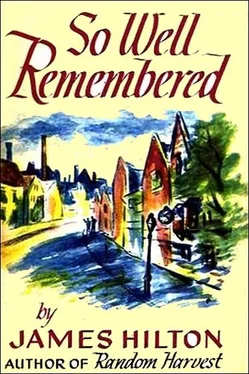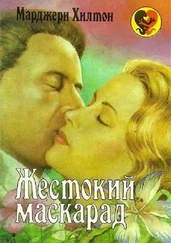Джеймс Хилтон - So Well Remembered
Здесь есть возможность читать онлайн «Джеймс Хилтон - So Well Remembered» весь текст электронной книги совершенно бесплатно (целиком полную версию без сокращений). В некоторых случаях можно слушать аудио, скачать через торрент в формате fb2 и присутствует краткое содержание. Год выпуска: 1945, Жанр: Проза, на английском языке. Описание произведения, (предисловие) а так же отзывы посетителей доступны на портале библиотеки ЛибКат.
- Название:So Well Remembered
- Автор:
- Жанр:
- Год:1945
- ISBN:нет данных
- Рейтинг книги:5 / 5. Голосов: 1
-
Избранное:Добавить в избранное
- Отзывы:
-
Ваша оценка:
- 100
- 1
- 2
- 3
- 4
- 5
So Well Remembered: краткое содержание, описание и аннотация
Предлагаем к чтению аннотацию, описание, краткое содержание или предисловие (зависит от того, что написал сам автор книги «So Well Remembered»). Если вы не нашли необходимую информацию о книге — напишите в комментариях, мы постараемся отыскать её.
So Well Remembered — читать онлайн бесплатно полную книгу (весь текст) целиком
Ниже представлен текст книги, разбитый по страницам. Система сохранения места последней прочитанной страницы, позволяет с удобством читать онлайн бесплатно книгу «So Well Remembered», без необходимости каждый раз заново искать на чём Вы остановились. Поставьте закладку, и сможете в любой момент перейти на страницу, на которой закончили чтение.
Интервал:
Закладка:
A few things gave him emotions in which pleasure, if it could be called that, came from an ironic appreciation of events. For instance, that the old Channing Mill in Mill Street had at last found a use; its unwanted machinery was junked for scrap metal, while its large ground-floor, levelled off, served as a headquarters and mess-room for the air-raid wardens.
And also that Richard Felsby’s land, which the old man had decided too late to give the town for a municipal park, had been compulsorily requisitioned for the drills and manoeuvrings of the Home Guard.
But no use could be found for Stoneclough. It remained a derelict in even greater solitude now that there were no holidays to tempt Browdley folks on hikes and picnics.
George was an exceedingly busy man. Not only was his printing business getting all the work it could handle, but his position as Mayor counted for more and more as the national and local governments of the country became closely integrated. For the first time in his life he had the feeling that he really represented the town, not merely his own party on the Town Council; and if this showed how limited his conception of mayoralty had been until then, he was disposed to concede the point. Anyhow, it was a satisfactory feeling, especially as his tasks were far too numerous to permit him to luxuriate in it. He was not a luxuriator, anyhow. And when he came home after a fourteen-hour spell of work, it was rarely with time left over to indulge a mood.
He did not even read in his study most nights, but made himself a cup of tea and went immediately to bed and to sleep.
The ordeal of the great cities continued. Night after night the wail of sirens and thudding of gunfire wakened Browdley, and sometimes a wide glow on one of the horizons gave a clue as to which of the greater near-by cities was being attacked. One night there came an emergency call for help from Mulcaster, and George accompanied several lorry-loads of Browdley men in a top-speed drive to the stricken area. Till then all his fire-fighting and similar work had been a rehearsal; but that night, from soon after midnight till long past dawn, he knew what the real thing was, and of course, like all real things, it was different. Crawling into smoking ruins while bombs were still falling in the neighbourhood, giving first-aid to the injured before a doctor could arrive, he directed his squad of co-workers under conditions which, despite all the training they had had, were in a dreadful and profound sense novel.
A youngish doctor asked him when the raid was over: “Been in this sort of thing before?”
George shook his head.
“I’d have thought you had, from the way you handled those stretchers.”
“Oh, I’ve done THAT before.”
“The last war?”
“Aye.”
“How would you compare it—this sort of thing—and that?”
George answered irritably: “I wouldn’t. And nor would you if you could.”
The men returned to Browdley with scorched and blackened faces, minor injuries, and a grim weariness of soul which, after sleep, changed to bitterness, determination, cheerfulness, even ribaldry—so strange is the alchemy of experience on men of differing make- up.
On George, after that first irritable outburst (which he later regretted as being needlessly melodramatic and quite out of character), the principal effect was a decision to do something which, at any previous time, would have been an acknowledgment of defeat, but which now, the way he could look at it, seemed more like victory over himself. He gave up the Guardian. He did not even try to sell it; he abandoned it. For years it had never more than just paid its way, and sometimes not even that; but the real issue, in George’s mind, was not financial at all. He suddenly realized that the paper had been costing too much in human effort, including his own, that could better be devoted elsewhere.
“It’s one thing with another,” he explained to Wendover. “Will Spivey’s getting old—it’s all he can do to manage the job printing— I’ll have to keep THAT going, of course—it’s my living. And then there’ve been newsprint difficulties, and you can’t get paper-boys any more, and I’ve just lost another man to the Army… And besides all that, I haven’t the time myself nowadays. If we should get a big raid on Browdley one of these nights, we’d all have our hands full. I know what I’m talking about, after what I saw in Mulcaster. Because I’d be responsible for things here, in a sort of way. There’s a lot more work in being Mayor than there used to be.”
“And I haven’t heard any complaints about how you’re doing it, George.”
“I’ll do it better, though, when the paper’s off my hands.”
“You’re sure you won’t regret not being an editor any more?”
“EDITOR?” George grinned. “What did I edit? Births, marriages, funerals, meetings, whist drives, church bazaars. The Advertiser’ll do that just as well—and one paper’s enough in a town of this size. Most folks always did prefer the Advertiser, anyway.”
“But you used to write your own stuff in the Guardian sometimes.”
“Aye, and there you come to another reason why I’m giving it up. D’you remember when I came to talk to you about that speech I made just after Dunkirk?”
“You mean the one in which you prophesied that Hitler would never lick us? Yes, I remember. And I’m beginning to think you were right.”
“For once. But as you said, I’d been pretty wrong before. I’m glad you said that because it made me think about it, and I never realized how wrong I actually had been till the other day I got out the back-files of the Guardian and re-read some of my old editorials. By God, they were wrong. After Locarno, for instance, I wrote about France and Germany finally burying the hatchet, and after Munich I said that even though the settlement wasn’t perfect, at any rate it might keep the peace of Europe for a generation… and only a few months ago I was blabbing that the Germans couldn’t break through in the West because of the Maginot Line… Mind you, I was always perfectly sincere at the time, but that only makes it worse. Seems to me, Harry, I’m just not cut out to deal with world affairs.”
“You’ve been as right as a good many of the politicians.”
“Aye, and that’s no compliment. Maybe it was a good thing I never got to Westminster—I’d have been just another fool with a bigger platform to spout from… And another thing occurred to me—I was thinking about it last night on warden’s duty—and it’s this—that the nearer I stay to Browdley the more use I am and the fewer mistakes I make. Look round the place—I have done SOME good things—not many, not enough—but they’re here, such as they are, and I don’t have to try to forget ‘em same as I do the stuff I used to put in the paper… Look at the Mill Street Housing Scheme, and the new Council School, and the Municipal Hospital, and the electric power station the Government took over. Aye, and the sewage farm, if you like—that’s mine too—remember what a fight I had over it? Those things are REAL, Harry—they exist— they’re something attempted, something done. They’re what I’ve been right about, whereas Czechoslovakia’s something I’ve been wrong about. So give me Browdley.”
“You’ve got Browdley, George.”
“Aye, and it’s got me. Till the war’s over, anyhow.”
“And afterwards, perhaps.”
“Don’t be too sure. There’s young chaps coming along as’ll make me a back number some day, but they’re in uniform now, most of ‘em… ‘Vote for Boswell and Your Children’s Future’—that was my old election slogan. I hope nobody else remembers it. I’d rather be remembered for the lavatories I put in the market square. Because they’re good lavatories, as lavatories go. Whereas the children’s future that I talked so much about…”
Читать дальшеИнтервал:
Закладка:
Похожие книги на «So Well Remembered»
Представляем Вашему вниманию похожие книги на «So Well Remembered» списком для выбора. Мы отобрали схожую по названию и смыслу литературу в надежде предоставить читателям больше вариантов отыскать новые, интересные, ещё непрочитанные произведения.
Обсуждение, отзывы о книге «So Well Remembered» и просто собственные мнения читателей. Оставьте ваши комментарии, напишите, что Вы думаете о произведении, его смысле или главных героях. Укажите что конкретно понравилось, а что нет, и почему Вы так считаете.










